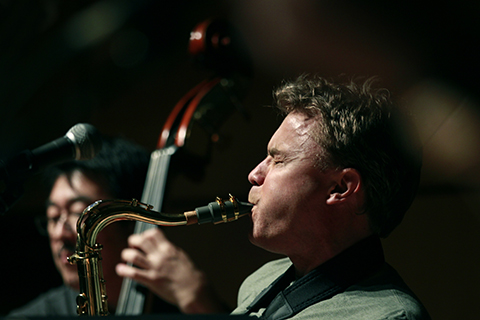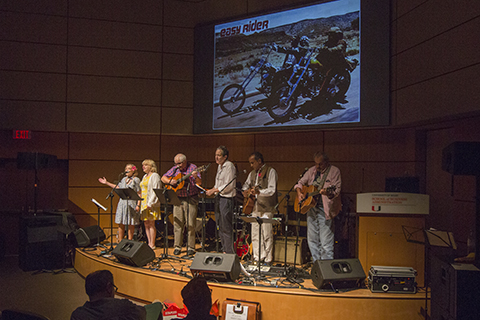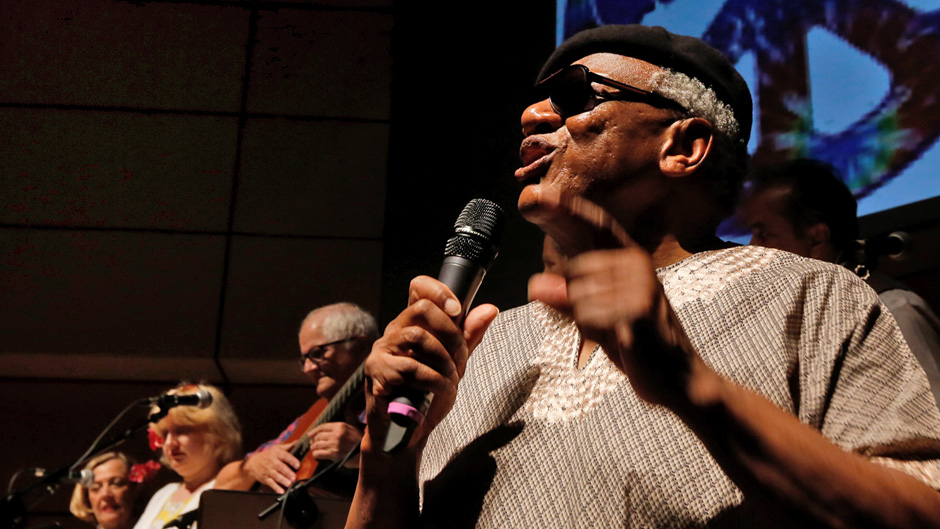With scintillating bass runs, soaring saxophone and guitar riffs, and singers belting out lead and harmony vocals, 74 University of Miami staff and faculty took the stage December 5 at Storer Auditorium to say “Bye Bye” to “The Sixties” course, in a musical tribute to one of the University’s most popular courses.
With a montage of iconic photos of The Beatles, Bob Dylan, and the Vietnam War rolling above as a stage background, the musicians set aside their research and coursework to offer a mind-blowing concert that included plenty of folk songs, jazz, Motown and R&B, and rock numbers in four different ensembles.
“The concert was superb,” said History Professor Don Spivey, who teaches “The Sixties” course together with English Professor Patrick A. McCarthy. “I moved to listen from different places, and the quality and enthusiasm of the performers was incredible—and this year we had the fewest number of rehearsals—people just rose to the occasion.”

Spivey, an accomplished drummer himself, might have mentioned that he moved to sit in on the drums with the jazz ensemble of pianist Max Bunster, project manager with Design and Construction; saxophonist Neil Johnson, physics professor; bassist Mitsu Ogihara, computer science professor; and special guest, Brenda Alford, an acclaimed singer/songwriter and UM alum, M.M. '08. The troupe drew a thundering ovation to their rendition of Miles Davis’ “Bye Bye Blackbird.”
Spivey founded the course in 2001 together with his good friend Zach Bowen, now deceased, and then chair of the UM English Department. He remembers that Bowen came to him with the idea for the class, and though Spivey initially resisted—imagining the administrative nightmare of coordinating dozens of faculty across multiple disciplines—he eventually relented when his colleague presented an irrefutable assertion: “Don, students need this course.”
Spivey didn’t find out until later that his good friend, prior to his stellar academic career, had been an amazingly successful used car salesman.
“The Sixties” blends lecture, discussion, film screenings and panel presentations to portray the conflictive culture of and history of the 1960s in the United States. Faculty members who witnessed dramatic episodes and participated in important events during the era share their personal accounts to advance students’ understanding and appreciation of the period.
The founders were insistent that music, because it was so pivotal to the era, had to be a part of course from the get-go. While they knew they could turn to the UM Frost School of Music to provide extraordinary music, their intention was different. The sixties were about involvement and participation, activism and a bit of chaos, and they wanted the course—and its musical component—to reflect that.
“Someone suggested that we’ve got a lot of talented faculty who are ‘closet musicians,’” Spivey remembers. “As we went around the room, someone said, ‘I play the guitar,’ another ‘I play the drums,’ ‘I like to sing,’ —it went like that and we knew we had something that could work.”
Yet just as the 1960s exploded in ways that no one ever could have imagined, the chaos of coordinating the first “rehearsal” overwhelmed Spivey and Bowen.
“We had 50 volunteers, and imagine the setting—a roomful of Ph.Ds, M.D.s, high-powered staff. Everything Zach and I suggested, well, they knew better,” Spivey says. “We couldn’t get anything done with the group in terms of music or rehearsal.”
They reconnoitered after and wondered who they might enlist to help. Alford, a UM grad and whose professional music career was blossoming, came to mind. They asked, and she agreed.
“Brenda came to that first meeting, clapped her hands once, and all the noise stopped. They all moved into ensembles and the rehearsal started,” Spivey remembers. “I asked her later what her secret was, how she did that.”
“I’m a musician, but also a third-grade teacher,” Alford reminded him.
After Bowen passed in 2010, Spivey partnered with several other colleagues over the years to team-teach the course. This fall and most recently, he and Patrick McCarthy share the immense coordination to offer panels with as many as 30 different faculty across disciplines, then to organize the concert and involve “closet musicians” from across the University.
While he himself came of age during the 1960s, Spivey says he’s always gratified to learn something new from the course itself.

With 30 different faculty joining the course, topics this semester ranged from “The Birth of the Sixties” and “The Civil Rights Movement” to “Women Activists and the Women’s Liberation Movement” and “The International Scene.” “The Music of the Sixties” concert culminates the course.
“What I hear from the students is that they’re hit by the fact that all these things—the activism of women, civil rights, the Vietnam War—were all going on at the same time. It was just one heck of a period,” Spivey says.
One student from the course, he suggests, said it best: “The Sixties is not a course, it’s a happening.”

